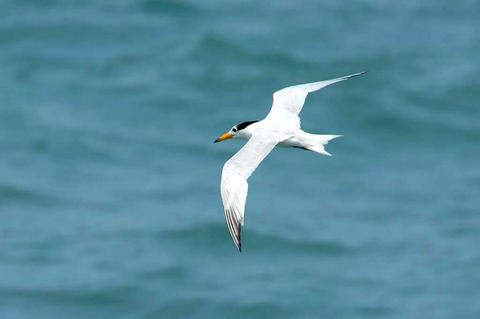The Year of the Rat may have started off in a bad way for Chinese Crested Terns, protected rare birds found on Matsu Island (
But international birding associations are working together to combat the invasion to preserve these precious feathered creatures, the Taiwan Sustainable Ecology Society (TSES) said yesterday.
"There have been reports that the rare birds face total elimination because of a rat invasion," Tien Chiu-Chin (田秋堇), TSES chairwoman told the Taipei Times. "Since the Chinese Crested Tern is only known to breed on Matsu, when international birding societies were informed that rats were attacking the bird's habitat and eating their eggs during breeding season, they were extremely alarmed."

PHOTO COURTESY OF LIAO PEN-HSING
Like gulls, terns are a type of seabird, although they are more slender and streamlined in physique, with sharp narrow bills and long narrow wings, Tien said.
Adult Chinese Crested Terns, also known as Matsu Terns, reach a body size of about 36cm and sport orange-yellow bills and a black crown, Tien said.
In the Matsu Tern Reserve, eight rare species of seabirds are protected, including Bridled Terns, Roseate Terns, Black-napped Terns, Greater Crested Terns, Black-tailed Gulls, Eastern Reef Herons, Fork-tail Swifts and Chinese Crested Terns, she said.
"For the past four or five months, international experts from the US, Japan and elsewhere who have experience in rat extermination have been working together to help save the birds, as there are only a few hundred left in the world," she said.
The budget for such extermination is about NT$1 million, she said, adding that the money would come from the Council of Agriculture.
The effort would need to be completed before April, as the breeding season for terns is between April and September, she said.
The rats were possibly brought to the islets when fishermen anchored their boats to fish in the area, Tien said, adding that the society had demanded that local fishing councils prohibit fishermen from doing so.

‘DENIAL DEFENSE’: The US would increase its military presence with uncrewed ships, and submarines, while boosting defense in the Indo-Pacific, a Pete Hegseth memo said The US is reorienting its military strategy to focus primarily on deterring a potential Chinese invasion of Taiwan, a memo signed by US Secretary of Defense Pete Hegseth showed. The memo also called on Taiwan to increase its defense spending. The document, known as the “Interim National Defense Strategic Guidance,” was distributed this month and detailed the national defense plans of US President Donald Trump’s administration, an article in the Washington Post said on Saturday. It outlines how the US can prepare for a potential war with China and defend itself from threats in the “near abroad,” including Greenland and the Panama

A magnitude 4.9 earthquake struck off Tainan at 11:47am today, the Central Weather Administration (CWA) said. The hypocenter was 32.3km northeast of Tainan City Hall at a depth of 7.3km, CWA data showed. The intensity of the quake, which gauges the actual effect of a seismic event, measured 4 in Tainan and Chiayi County on Taiwan's seven-tier intensity scale, the data showed. The quake had an intensity of 3 in Chiayi City and County, and Yunlin County, while it was measured as 2 in Kaohsiung, Nantou County, Changhua County, Taitung County and offshore Penghu County, the data showed. There were no immediate reports of

The Chinese Nationalist Party (KMT) is maintaining close ties with Beijing, the Democratic Progressive Party (DPP) said yesterday, hours after a new round of Chinese military drills in the Taiwan Strait began. Political parties in a democracy have a responsibility to be loyal to the nation and defend its sovereignty, DPP spokesman Justin Wu (吳崢) told a news conference in Taipei. His comments came hours after Beijing announced via Chinese state media that the Chinese People’s Liberation Army’s Eastern Theater Command was holding large-scale drills simulating a multi-pronged attack on Taiwan. Contrary to the KMT’s claims that it is staunchly anti-communist, KMT Deputy

RESPONSE: The government would investigate incidents of Taiwanese entertainers in China promoting CCP propaganda online in contravention of the law, the source said Taiwanese entertainers living in China who are found to have contravened cross-strait regulations or collaborated with the Chinese Communist Party (CCP) could be subject to fines, a source said on Sunday. Several Taiwanese entertainers have posted on the social media platform Sina Weibo saying that Taiwan “must be returned” to China, and sharing news articles from Chinese state media. In response, the Mainland Affairs Council (MAC) has asked the Ministry of Culture to investigate whether the entertainers had contravened any laws, and asked for them to be questioned upon their return to Taiwan, an official familiar with the matter said. To curb repeated